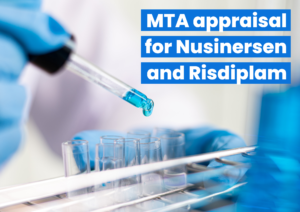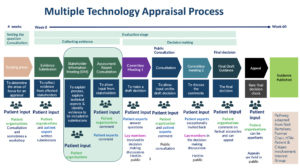Advocacy for Access to Nusinersen and Risdiplam in 2024

Advocacy for Access to Nusinersen and Risdiplam in 2024
Page last updated: 26th June 2024

The National Institute of Health and Care Excellence (NICE) approved Nusinersen (Spinraza) for funding by the NHS in England in July 2019 and for Risdiplam (Evrysdi) in August 2020. Both treatments have been funded via time limited Managed Access Agreements (MAA) which come to an end this year (2024).
Open the tabs below to find out what is happening now…..
These MAAs allowed access to these treatments on the condition that researchers would collect more information from patients and their clinicians on:
- how well the treatment works,
- how safe it is
- whether or not it is good value for money.
In 2019 – 2020, the NICE committee did not feel there was enough evidence from the clinical trials to answer these questions.
This is why, if you have been prescribed either of these drugs, you will have been completing physio assessments, answering questions and completing patient reported outcomes which will be used as evidence.
When two or more treatments are used for the same condition, NICE reviews them at the same time via a Multiple Technology Appraisal (MTA).
They look at:
- all the evidence that has been collected while the MAAs have been in place
- any new evidence from clinical trials
- international studies
They also invite any groups that have contact with, or are part of, the SMA Community, to submit any evidence they hold and give their views on the specific questions they are looking to answer.
You can see the list of these potential ‘stakeholders’ on this NICE website page.
NICE also commission an external assessment group to review all the information This group examines all the evidence submitted by the different stakeholders. For this MTA, Researchers at the University of Warwick are leading this work. The results of their independent study will be used to help the decision makers. You can read their final protocol here.
October 2024 Committee meeting.
NICE will meet review all the evidence. This is their opportunity to ask the SMA clinical and patient experts (open tab below to see who these are) and pharmaceutical companies any last questions they have on the effectiveness, safety and costs of the two drugs..
When to will we know what NICE recommends?
About three weeks after the committee meeting, NICE will send out their draft recommendations to all consultees. The patient groups and others experts involved will then have 20 working days to submit their comments before the recommendations are published.
If there are no appeals against the draft recommendations, the guidance will be published about 16 weeks after the final committee meeting.
It often takes more than one committee meeting for NICE to make a very final recommendation.
Wales and Northern Ireland have followed NICE’s guidance on access and are likely to follow the recommendations.

This webinar summarises the process, the role of the patient groups and includes our earlier call for action.
Video recorded: 17th February 2024
SMA UK, Muscular Dystrophy UK (MDUK) and TreatSMA are consultees to the appraisal committee; this means we have the opportunity to contribute to the decision-making process in a number of different ways.
Scoping Consultation.
In August 2023 we were all invited to review the background information that was provided to all parties involved in the assessment to ensure it is correct and detailed enough from the community’s perspective. SMA UK and Muscular Dystrophy UK responded jointly. You can read our response here.
NICE’s final consultation questions.
At the beginning of January 2024, based on the comments from the patient groups, clinicians, scientific experts and pharmaceutical companies, NICE sent out the final consultation questions
Preparing for our consultation submission – our survey.
From professional discussions with industry and clinicians, it became clear that the clinical evidence was not really reflecting the real-life experiences of treatment for those living with SMA. Notably, the value of stabilisation for adults and the importance of access for all no matter the severity of the condition. SMA UK led a survey to obtain real-life feedback from the community. Thank you to all who responded.
We received responses from:
- 114 people living with SMA, bringing perspectives of both treatments being assessed
- 144 carers, sharing their invaluable thoughts and experiences.
The joint patient groups submission.
On 19th April 2024, SMA UK led on a response as a unified voice from the three patient groups and the SMA Community to the NICE appraisal committee members.
Jointly we are advocating for:
- all those who have SMA Type 1, 2 or 3 so that they can access whichever of these two drugs their clinician agrees is the safest option for them.
- access to nusinersen for those who have SMA Type 4 and are not currently considered eligible for any treatments.
Nusinersen has a licence to treat all with 5qSMA. Although there is no clinical trial evidence of it being used with those with Type 4, the condition has the same genetic cause.
Risdiplam’s licence is only for SMA Type 1, 2 and 3. It is not possible for NICE to make a recommendation that goes beyond the licence.
Read our unified response along with the appendix below.
Patient and clinical experts.
NICE usually asks for nominations and selects two patient experts to a committee meeting to give the patient perspective of the treatment being discussed. SMA UK, TreatSMA and MDUK all advocated for the need for more than this given there are two different treatments being assessed, which are prescribed to a wide range of ages and ‘SMA Types’.
On 4th March all three patient groups met with the chair of the committee to discuss why a wider representation is so important for this assessment.
The chair confirmed that he would allow three patient experts:
- Portia Thorman, representing children
- Lucy Frost, representing teenagers
- Andi Thorton, representing adults
An explanation of what happens if the committee does not recommend either treatment for NHS funding is written into the Managed Access Agreements. See the relevant extracts from the documents below:
Risdiplam (Evrysdi):
The full Risdiplam Managed Access Agreement
Nusinersen (Spinraza):
The full nusinersen Managed Access Agreement
We understand the anxiety this will bring to Spinraza-treated patients. At SMA UK we are doing all we can to retain NHS funding for both treatments, ensuring everyone living with SMA has the choice of available disease-modifying treatments to suit their individual needs. We will be advocating for full and equal access for all.
We asked Biogen UK for their comments. On 25th June 2024 they said:
‘Due to the nature and complexity of a Multiple Technology Appraisal (MTA), a final outcome is not expected until around April – July 2025. Furthermore, the full terms of the Managed Access Agreement (MAA) for nusinersen for new and existing patients, remain in place throughout the appraisal period until new guidance is published following the final outcome.
It is important to understand that the NICE process is designed to evaluate the clinical and cost effectiveness of a medicine. It is possible that following the first committee meeting (currently scheduled for 2nd October), NICE issue an interim negative recommendation for part of, or all of the population being appraised. However, it’s important to note that further committee meetings will take place to either confirm or overturn this interim decision following a period of public consultation and commercial discussions. For example, over the past 2 years, 17 of 21 rare disease medicines (81%) that received an interim negative decision after the first committee meeting eventually received a positive recommendation. This was usually after a second or third committee meeting*.
Whilst Biogen recognises the outcome of the process may seem uncertain at this time, 32 of 34 medicines (94%) that have been assessed at the end of a Managed Access Agreement have received a positive recommendation following their NICE re-appraisal*.
Please be assured, Biogen is working very hard to ensure the nusinersen NICE appraisal is positive and that we achieve broad access for as many patients as possible in the UK.‘
*Analysis of NICE HTA outcomes from MAP Patient Access Ltd. HTA database for Biogen, April 2024
Our survey has now closed – thank you to everyone who submitted their responses.
Your views and experiences are always helpful for us. If you missed the survey and would still like to tell us why access to these treatments matter to you, please contact us in one of these ways:
- A written summary to office@smauk.org.uk
- Audio/video to WhatsApp 07759210888
- Use WeTransfer to send to office@smauk.org.uk